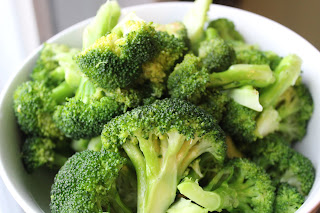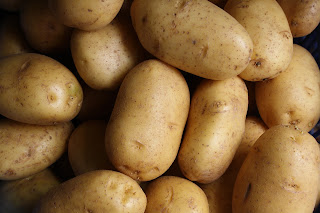Should you be drinking potato milk?
There are so many alternatives to cow's milk these days. People may choose to drink them for ethical reasons, environmental reasons, or just because they prefer the taste.
In this blog post, I’m going to be looking purely at the nutritional side of things when it comes to non-dairy milks.
What are the main nutrients in cow milk?
Cow’s milk is a nutrient powerhouse, and it's relatively
cheap too. If you’re swapping cow milk for something else, it’s worth thinking
about the nutrients that you could be missing out on.
Protein:
I’m sure I don’t have to tell you that cow milk is a source
of protein. 100ml of semi skimmed cow milk has 3.5g of protein. The average man
needs 55g of protein, and the average woman needs 45g of protein a day. So having
milk with cereal or porridge and in your tea or coffee every day can contribute
to your protein intake.
Protein is the building block of our bodies, with our hair,
skin, and muscles being made out of it. Protein is also needed to make
hormones, enzymes, and immune system cells. Other sources of protein are beans,
lentils, nuts, and wholegrains like quinoa.
Calcium:
Calcium is another key nutrient found in cow milk. 100g of semi skimmed milk has 120mg of calcium. The average person needs 700mg of calcium a day. Calcium is needed to keep our bones healthy, help our heart contract, and has a role in blood clotting.
Non-animal sources of calcium include green vegetables, tofu
(if set with calcium), and nuts.
Iodine:
Cow’s milk is a good source of iodine. 100ml of semi skimmed
milk has 30ug of iodine. Adults need 140ug of iodine a day. Iodine is needed to
make your thyroid hormones. These are crucial for controlling your metabolism.
Other sources of iodine include seaweed, eggs, and fish.
Vitamin B12:
Vitamin B12 is only found in animal products, so if you’re
swapping cow milk for a plant based milk, this is a crucial nutrient to be aware of.
100ml of semi skimmed cow milk has of 0.9ug of B12. Adults need 1.5ug of B12
daily.
Vitamin B12 is needed in the production of red blood cells and helps us use the energy from our food.
Milk also contains other nutrients like vitamin
D, phosphorus, and potassium. This isn’t to say that you can’t get these
nutrients without consuming milk, but if you normally have cow milk and then
switch to something else, you’ll need to ensure you’re replacing this potential
nutrient gap.
How do milk alternatives compare to cow's milk nutritionally?
Now let’s look at the milk alternatives and see how they
fare.
It’s important to go for fortified milk alternatives as
these will have all the vitamins and minerals, you’d normally find in cow milk
added into them. If you buy organic products then these won’t be fortified.
You can spot the nutrient fortification by looking at the ingredients
list, and most brands will highlight the fact that it’s fortified on the
packaging.
Almond milk:
Almond milk is a lot lower in protein, than cow milk, with
0.4g per 100ml. It also doesn’t contain the nutrients found in cow milk like
calcium or vitamin B12 unless it’s fortified.
Oat milk:
Oat milk is low in protein, with 0.5g per 100ml. Again, if
you buy a brand that fortifies the milk then you won't have to worry about
missing out on the vitamins and minerals.
But one thing to consider is that oat milk is higher in carbohydrates and sugar than other non-dairy milks. This is naturally occurring sugar from the oats. Cow milk also has naturally occurring sugars, in the form of lactose. But due to the fact that oat milk is lower in protein and fat compared to cows’ milk, it’ll cause a sharper rise in your blood sugar levels after drinking it. This is because the carbohydrates in oat milk will be digested quicker.
So, it’s important to try and have it as part
of a balanced meal e.g., with a wholegrain cereal and with some nuts sprinkled in, to
slow down the sugar absorption.
It's not something to be too concerned about, but if you
have a condition like diabetes, it’s worth being aware.
Potato milk:
You might be spotting a theme here, but potato milk is also
lower in protein. 100ml of potato milk has 1.3g of protein. This is higher than
other plant based milks, but still fairly low. When fortified, it has similar amounts
of all the vitamins and minerals to cow milk.
Soy:
I don’t want to be biased, but soy milk would be my choice
of non-dairy milk purely for the protein content. It’s very close to being like
for like with cow milk, with 100ml of soy milk having 3.4g of protein. If you
opt for a fortified option, it’s also pretty similar in terms of the vitamin
and mineral content.
In conclusion…
Of course, the choice of what milk you drink is down to you.
But I hope this post has highlighted some of the nutritional considerations
when choosing a milk to consume. Protein is an important macronutrient, but you
can get enough protein without drinking cow milk.
The most important thing to remember is that if you buy
plant based milks, is to buy the fortified versions so you still get all the micronutrients
you need.
If you want to know more about what all the vitamins and minerals do in your body, I've got a series here that explores each nutrient.
Key points:
- Cow’s milk is a good source of protein, calcium, and other nutrients.
- Plant milks tend to be lower in protein and micronutrients unless they have vitamins and minerals added in (fortification).
- Soy milk has a similar protein content to cow milk.
I hope you enjoyed this blog post!
Bye for now 👋
References:
https://quadram.ac.uk/UKfoodcomposition/foods/milk-semi-skimmed-pasteurised-average/
https://www.nhs.uk/conditions/vitamins-and-minerals/calcium/
https://www.tesco.com/groceries/en-GB/products/273706064
https://www.tesco.com/groceries/en-GB/products/307745622
.jpg)

.jpg)
.jpg)

.jpg)

Comments
Post a Comment